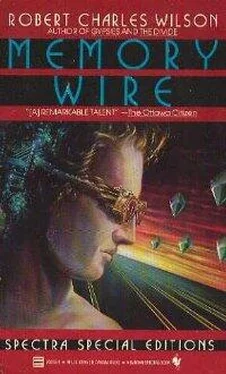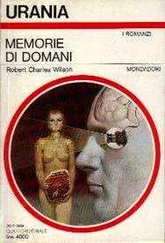Robert Wilson - Memory Wire
Здесь есть возможность читать онлайн «Robert Wilson - Memory Wire» весь текст электронной книги совершенно бесплатно (целиком полную версию без сокращений). В некоторых случаях можно слушать аудио, скачать через торрент в формате fb2 и присутствует краткое содержание. Год выпуска: 1987, ISBN: 1987, Издательство: Bantam Spectra, Жанр: Фантастика и фэнтези, на английском языке. Описание произведения, (предисловие) а так же отзывы посетителей доступны на портале библиотеки ЛибКат.
- Название:Memory Wire
- Автор:
- Издательство:Bantam Spectra
- Жанр:
- Год:1987
- ISBN:978-0-553-26853-9
- Рейтинг книги:4 / 5. Голосов: 1
-
Избранное:Добавить в избранное
- Отзывы:
-
Ваша оценка:
- 80
- 1
- 2
- 3
- 4
- 5
Memory Wire: краткое содержание, описание и аннотация
Предлагаем к чтению аннотацию, описание, краткое содержание или предисловие (зависит от того, что написал сам автор книги «Memory Wire»). Если вы не нашли необходимую информацию о книге — напишите в комментариях, мы постараемся отыскать её.
Memory Wire — читать онлайн бесплатно полную книгу (весь текст) целиком
Ниже представлен текст книги, разбитый по страницам. Система сохранения места последней прочитанной страницы, позволяет с удобством читать онлайн бесплатно книгу «Memory Wire», без необходимости каждый раз заново искать на чём Вы остановились. Поставьте закладку, и сможете в любой момент перейти на страницу, на которой закончили чтение.
Интервал:
Закладка:
We are close now, she thought, and the pronoun came so naturally to her that she did not notice its strangeness: we.
2. From here, as Keller understood the plan, they would cease to be tourists. They would pass, for a day or maybe two, into the sertao hinterland. They would be taken to Pau Seco by a truck driver, an expatriate Vietnamese named Ng.
But Ng wasn’t at the hotel. No problem, Byron said. They were booked for three days. Ng would be here tomorrow, guaranteed. Day after at the latest.
Keller shrugged, spreading out his bedroll on the floor of the hotel room.
“Hotel” was a generous word. Cuiaba was not in any sense a tourist town. The building was a box of ancient stucco and rotting wood. Byron and Teresa each occupied one of the room’s two tiny beds. Keller lay in the dark for a time, aware of the night noises; meat trucks moaning down the narrow streets, the empty distances between the old buildings. Aware, too, of the distance between himself and Teresa, between Byron and Teresa: distances that had become electric with implication.
He understood now—it had taken a few days—how profoundly Byron was in love with her.
Understood, too, that the feeling was not mutual.
It surprised him a little. A decade ago Byron had been the model Angel—slick, aloof, obscure behind protective lenses. It was the image he still projected, dealing dream-stones in the Floats. But with Teresa (Keller saw all this ruthlessly) he was another thing altogether: nervous, gazing at her when he thought she wouldn’t see, almost fawning.
Strange, but maybe predictable. Byron had rescued her from a slow suicide: some sense of responsibility had to follow on that. Too, there was this aura of unfinishedness about her. She was drawn by strange tides. She had imbibed often and deeply at the well of the oneiroliths. Keller recognized that there was an allure in all this—night territory, dangerous and exotic. He understood the attraction.
Understood it, he thought, maybe too well.
His eyes strayed to the bed where she slept.
In spite of his doubts, in spite of his lapses, he had learned in the years since the war to practice scrupulously the art of wu-nien. And he had learned to recognize the threats to that condition. The threats were named Compassion, and Hate, and Desire, and Love. In Angel basic he had been taught to set these things aside as earnestly as a Buddhist monk sets aside the temptations of the flesh. But like the temptations of the flesh, they were difficult to suppress. Suppressed, they were prone to erupt—randomly, unexpectedly.
He lay in the cloistered darkness with his pulse whispering in his ears. In the dim city light through the curtains, he could make out the shape of her body under the blankets—the delicate geography of her.
You know better than to think what you’re thinking.
He closed his eyes and worked to make his mind empty. A mirror bright, he thought, echoing the Shen-shiu poem they had all memorized in Angel basic: Carefully we wipe it clean / And let no dust alight.
But the dust had alighted, Keller realized. Feelings welled up in him that he had thought long cauterized.
Adhyasa, he thought bleakly. Angel sin.
He woke up wearily; Byron handed him a cup of coffee from the wall dispenser. By midmorning their truck driver still hadn’t arrived. Teresa moved restlessly around the room in fatigue pants and a khaki shirt, hands in her pockets, brooding. “I want to go out,” she said at last.
“We have to wait here,” Byron said. “We have to be here when Ng shows up.”
“We don’t all have to stay.”
Byron drew his head back, drummed his fingers thoughtfully. “Where do you want to go?”
“The church we passed. The dreamstone church.”
“It’s a Valley church,” Byron said. “Jungle cults. You want to sacrifice a chicken? Maybe we can arrange it.”
Keller remembered the Valley from the war. The Vale do Amenhecar was a Brazilian stone cult, one of the junk religions that had prospered since the discovery of the ’liths. It was a peasant’s religion, wildly syncretic; they believed in sacred jaguars, the divinity of Christ, the imminent arrival of fleets of flying saucers.
“I want to see what it’s like,” Teresa said. She added quietly, “I have a right.”
“It’s not safe.”
“None of this is safe.’.’ She turned to Keller. “You want to come along?”
He said yes without thinking about it.
Byron turned stiffly to the window. Over his shoulder Keller saw the rain sheeting down from a leaden sky. The streets were slick and black. “Go ahead,” Byron said coolly. “Pick up some local color.” He looked back at Keller, pained. “Why the hell not.”
3. She bought an umbrella at one of the sidewalk stalls and held it over them. It was hardly more than waxed paper, she thought, the color of a dahlia, but it kept the drizzle off.
Keller said, “He loves you, you know.”
Byron, he meant. It took her by surprise. She peered at Keller—at his blue eyes, studiedly inscrutable. She said, “Is that an Angel question? Or are you really worried about him?”
“It wasn’t a question,” he said coolly. “And I guess it’s none of my business. But you can’t look at him and not know it.”
Traffic flooded down the wet streets—electric carts, scooters, big Japanese cars. Keller hunkered down under the umbrella; he put his hand around her waist. She said carefully, “I love Byron. I do. I love him for what he’s done. I’m not callous.”
“There are all kinds of love.”
“We were together a while. It didn’t work out.”
“He hasn’t stopped caring.”
“I’m grateful for that too. There are times when I’ve needed him. Maybe that’s selfish—I don’t know.” She frowned, wondering at Keller’s curiosity.
He said, “It just took me by surprise. I didn’t know he could be so …” He groped for the word. “Single-minded.”
“Obsessed, you mean. But we all are.” They had reached the church now, candles burning behind dust-caked windows. “Obsessed,” she said. “All three of us.” She put her finger out, touched the painted icon of the dream-stone. She felt Keller’s sympathy fade abruptly.
He took her hand and pulled it back. “You follow that thing,” he said, “you could follow it a long way down.”
“You know all about it, right?” He looked startled. But it was not an insult. She meant it. “Being an Angel must be like that. Byron talks about it sometimes. Seeing without feeling.” She looked at him cautiously. “Seems like you followed it a long way down already.”
A curtain came down over his face. “It’s not the same.”
She shrugged and opened the door.
The interior of the church was dark and empty. Long ago it must have been a Catholic church, buried here between the taller and newer buildings. Behind the altar there was a soot-dark stained-glass intaglio of the Virgin Mary with her hand upraised. The glass was illuminated faintly from below; no exterior light entered here.
An old woman stepped out from a back room. She regarded them with a crabbed expression and spoke in sibilant Portuguese. Keller translated: “She says tourists aren’t permitted.” Igreja, the old woman said. “It’s a church.”
“Tell her we want to use a stone.”
Keller spoke haltingly. The old woman sighed and went into the back. Teresa sat down at one of the candlelit tables that had been installed where the pews might once have been. The woman returned with a tin lock-box clamped under her arm. She held the box protectively and extended her open hand, palm up. Keller gave her a hundred-cruzeiro note.
The old woman took up a station by the door as Teresa opened the box.
Читать дальшеИнтервал:
Закладка:
Похожие книги на «Memory Wire»
Представляем Вашему вниманию похожие книги на «Memory Wire» списком для выбора. Мы отобрали схожую по названию и смыслу литературу в надежде предоставить читателям больше вариантов отыскать новые, интересные, ещё непрочитанные произведения.
Обсуждение, отзывы о книге «Memory Wire» и просто собственные мнения читателей. Оставьте ваши комментарии, напишите, что Вы думаете о произведении, его смысле или главных героях. Укажите что конкретно понравилось, а что нет, и почему Вы так считаете.












